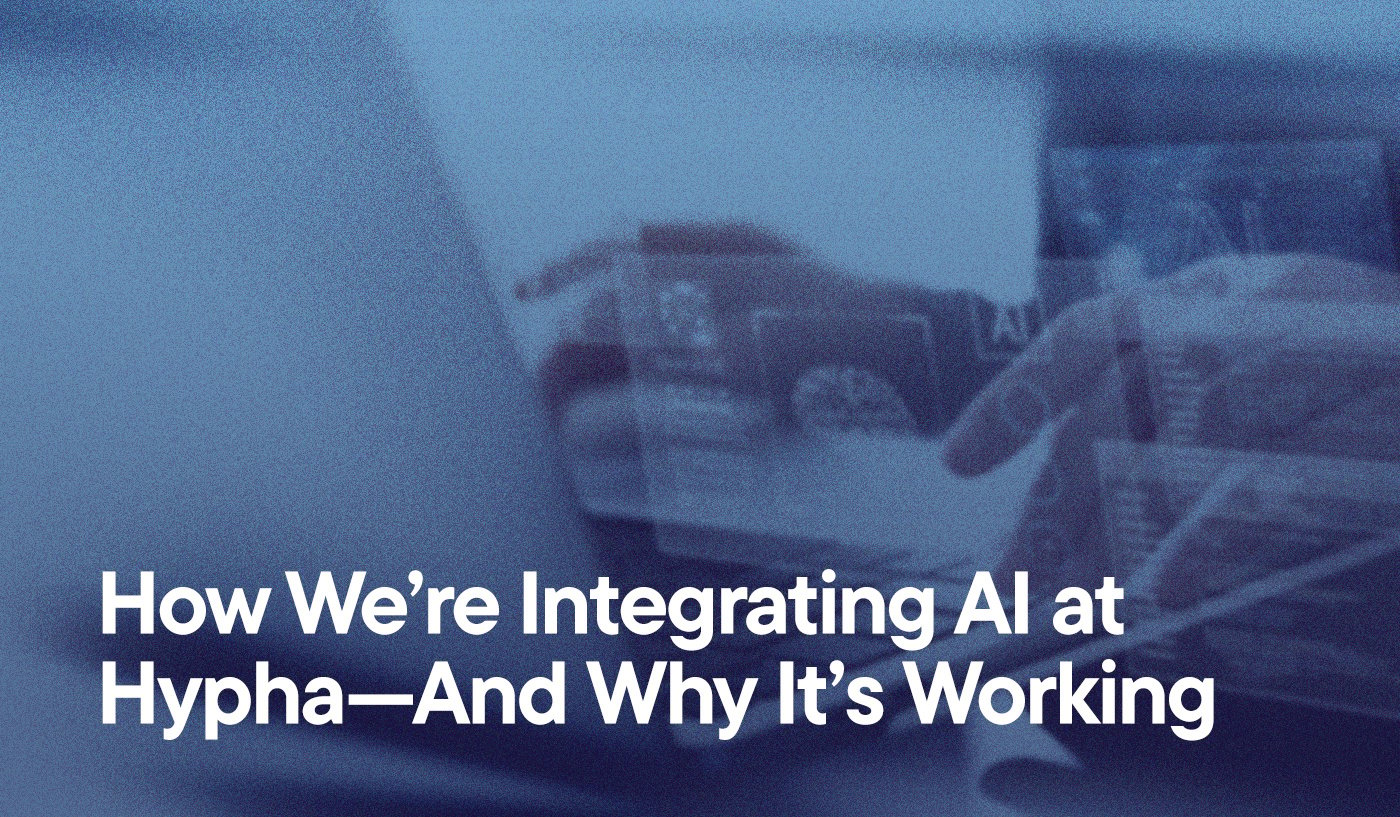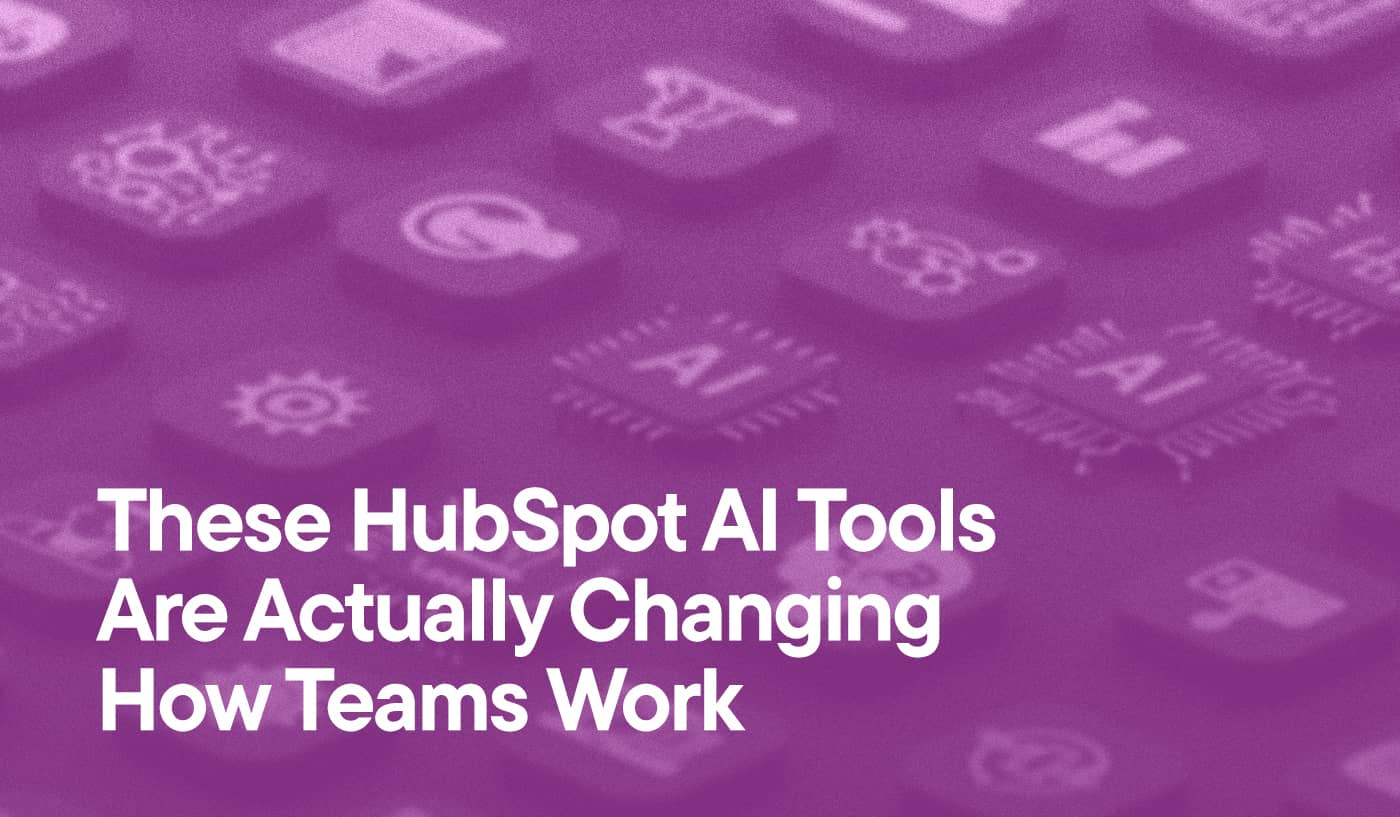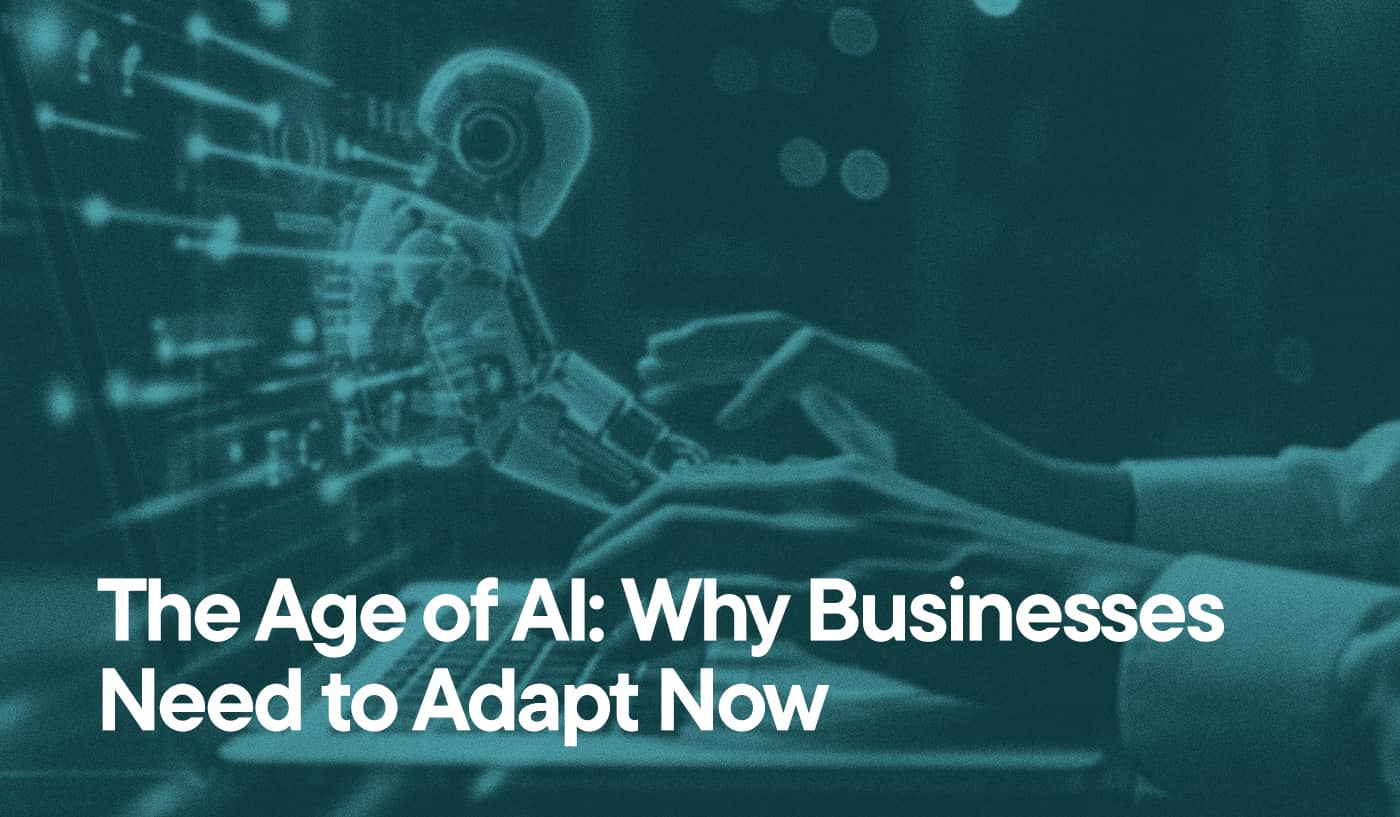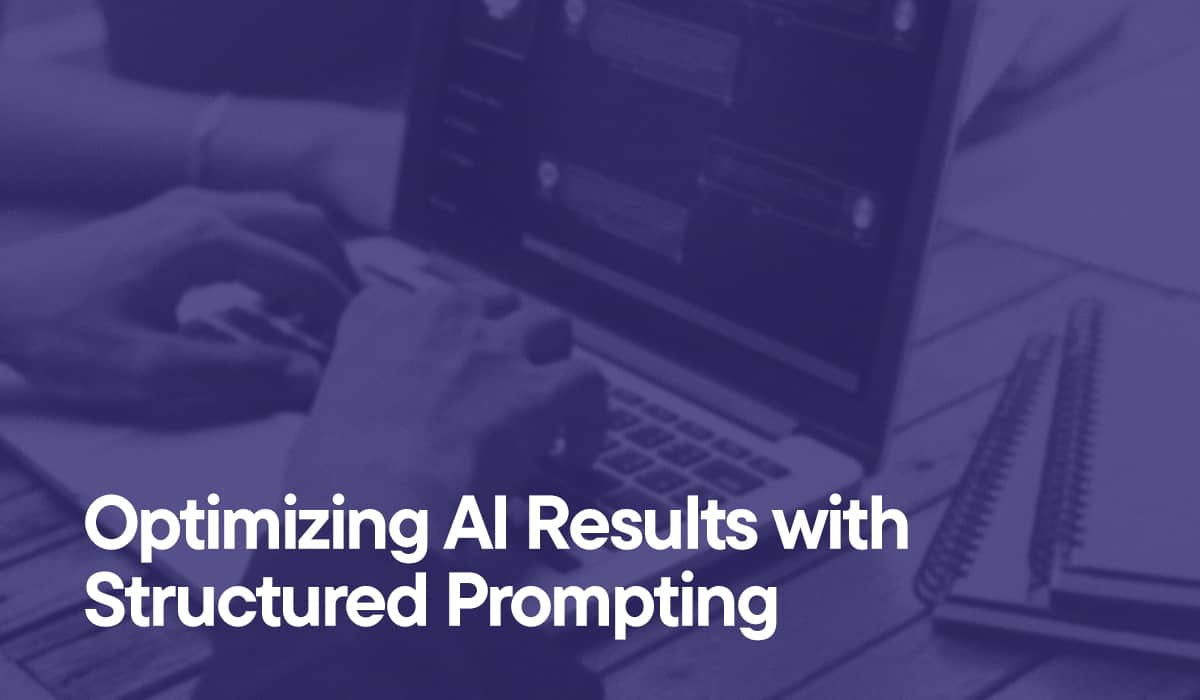The little-known secret across industries is that your employees are already leading the charge toward greater AI adoption at your company—whether leadership realizes it or not.
According to McKinsey & Company’s report “Superagency in the workplace: Empowering people to unlock AI’s full potential,” the majority of employees describe themselves as “AI optimists.”
Even more revealing: 3x more employees are using generative AI for a third or more of their work than their leaders even realize.
This doesn’t surprise us at Hypha: Across our organization, team members have naturally gravitated toward tools like Claude, ChatGPT, Perplexity, and HubSpot’s built-in AI capabilities to enhance their daily work.
As HubSpot platform engineers, our technical expertise has enabled us to explore these AI tools more deeply and integrate them more effectively into our workflows.
What started as individual experimentation has evolved into a company-wide approach to working smarter, not harder.
Here’s how we’re embracing AI across Hypha—and the lessons we’ve learned along the way.
Our AI Philosophy: Empowerment Over Mandates
At Hypha, we’ve taken a distinctly human-centered approach to AI adoption.
Instead of dictating specific tools or use cases from the top down, we’ve empowered our team members to explore and integrate AI in ways that make sense for their specific roles and challenges.
Why? Because nobody understands the nuances of a job better than the person doing it every day.
-
After independent exploration, our content developers now leverage AI to enhance SEO strategies and optimize content for both human readers and search algorithms.
-
Web developers use Claude and ChatGPT to troubleshoot complex coding challenges, often resolving issues more effectively.
-
Perhaps most unexpectedly, we’ve seen team members with no prior coding experience using generative AI to create sophisticated visualizations for blogs and site pages—developing entirely new skills through this collaborative relationship with AI.
Organic adoption has created a virtuous cycle: individual discoveries lead to team-wide improvements, which ultimately translate to better outcomes for our clients.
It’s this same approach that now informs our AI Consulting Services, where we help other businesses optimize operations, enhance customer experiences, and drive measurable growth through thoughtful AI implementation.
Employee-Led Approach
Organic Adoption
Team members discover and integrate AI tools based on their specific needs
Role-Specific Solutions
AI applications tailored to actual workflows and challenges
Cross-Functional Innovation
Knowledge sharing across teams leads to unexpected applications
Higher Engagement
Natural motivation to use tools that employees chose themselves
Top-Down Approach
Mandated Tools
Specific AI solutions selected by leadership without user input
Uniform Training
Standardized approach regardless of team needs or expertise
Rigid Implementation
Fixed processes with little room for adaptation or experimentation
Adoption Resistance
Lower engagement due to lack of user input in selection process
The Hypha Approach
At Hypha, we embrace the employee-led approach to AI implementation, which not only leads to organic adoption but paves the way for greater collaboration among teams. By empowering our staff to discover and integrate AI tools based on their specific needs, we've fostered a culture of innovation and continuous improvement that directly benefits our clients.
AI in Action: How Different Teams Are Leveraging Technology
Content Production
For our editorial team, AI has transformed both planning and execution. While our research strategies haven’t completely changed, new tools help us analyze keyword opportunities, identify content gaps, and develop comprehensive content plans aligned with client goals.
When it comes to content creation, AI helps generate initial drafts based on strategic direction, which our experienced writers then refine, infuse with brand voice, and enhance with their subject-matter expertise.
While AI has made our content developers better strategists, it hasn’t completely revolutionized what we do.
No doubt, we’ve had our share of frustrating moments with various AI tools—a very relatable experience, we suspect. This includes examples of hallucinations even after providing strict instructions intended to theoretically prevent avoidable mistakes.
And to be sure, we haven’t gotten to the point where we’re significantly reducing the time it takes to produce various forms of content—it’s simply helped us ensure anything we publish has a better chance of succeeding, whether in search results or in how people engage with what we’re producing. That’s a good thing—and why integrating AI is important.
Strategy
Other members of the team now leverage AI to quickly synthesize massive amounts of information from clients, industry research, and other relevant data. This helps them identify opportunities that might otherwise remain hidden in the noise.
When developing new ways to support clients, our team members use AI to transform complex concepts into clear, compelling narratives and to formulate new approaches to help them achieve their goals.
The quality improvements are what truly matter. With AI handling more of the information processing, our strategists can devote more mental bandwidth to the aspects of their work that require human judgment, empathy, and creativity.
Here’s a streamlined version of the AI Vanguard section:
The AI Vanguard: Collaborative Innovation in Action
Early in 2025, we formalized our commitment to AI-enabled innovation by creating the “AI Vanguard”—a cross-functional team dedicated to exploring and implementing new AI applications across the business.
Unlike traditional technology committees, our Vanguard team includes members from every department, bringing diverse perspectives to the table. They meet daily to share discoveries, collaborate on solutions, and maintain an open-door policy where any team member can present challenges that might benefit from AI solutions.
Case Study: Reinventing the HubSpot Chatbot Experience
One of the Vanguard’s most successful projects involved reimagining our approach to HubSpot chatbots.
Rather than training the AI on our entire website (which often leads to generic responses and inaccuracies), the team meticulously curated specific information sources for the chatbot’s training.
The results were impressive: a chatbot that provides precise answers about our services, maintains a consistent brand voice, and delivers significantly higher accuracy.
As an added benefit, the curated content was optimized to help improve our performance in both traditional search and AI-powered search results. This approach has now become a blueprint for implementing similar solutions for our clients.
Solving Complex HubSpot Data Challenges with AI
Another Vanguard success story involved automating the association between Companies and Deals in HubSpot. The challenge was that Deal names often contained variations of the Company name (such as “Hypha HubSpot Development” appearing as “Hypha Development”).
The team implemented an AI-powered solution that could recognize potential matches despite textual differences—something traditional string comparison methods couldn’t achieve. This significantly improved the client’s data management process, automating connections that previously required manual intervention and creating a more cohesive view of customer relationships.
Transform Your Business With AI Technology
Struggling to Keep Pace With the AI Revolution?
Discover Our Strategic AI Integration Solutions arrow_forward
Lessons Learned: Navigating the AI Transformation
Our journey with AI continues to evolve, but we’ve already gathered valuable insights that might help other organizations on similar paths:
-
Trust your team’s judgment. When given the freedom to explore AI tools independently, employees will naturally gravitate toward applications that deliver real value.
-
Start with pain points, not possibilities. The most successful AI implementations address specific challenges or inefficiencies rather than deploying technology for its own sake.
-
Create space for collaboration. Cross-functional teams like our Vanguard accelerate innovation by bringing diverse perspectives to common challenges.
-
Balance efficiency with quality. The goal of AI integration should never be simply to do things faster, but to raise the bar on what’s possible.
-
Embrace the learning curve. Even the most intuitive AI tools require time and experimentation to master. Patience yields exponential returns.
Looking Forward: The Future of Work at Hypha
As AI capabilities evolve at a breathtaking pace, we’re committed to maintaining our balanced, human-centered approach.
We’ll continue empowering our team to explore new tools and applications, while ensuring that our core values of quality, creativity, and client service remain at the heart of everything we do.
For our clients, this means partnering with a team that combines deep HubSpot expertise with cutting-edge AI capabilities—delivering solutions that aren’t just technically sophisticated but strategically sound and creatively distinctive.
It’s why we’ve expanded our service offerings to include dedicated AI Consulting Services, helping other organizations navigate their own AI journeys with the same thoughtful, business-focused approach we’ve used internally.
Want to unlock the full potential of HubSpot AI? Our platform engineers can supercharge your operations. Contact our team to discuss your HubSpot AI implementation needs.




